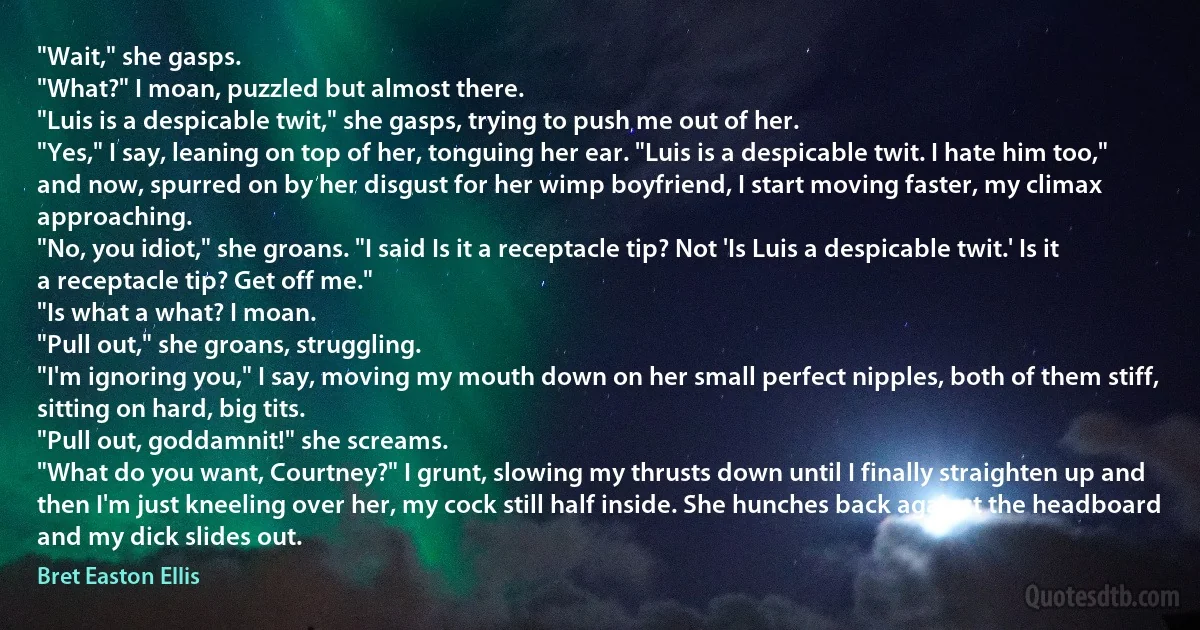Ignoring Quotes - page 9
This is why I am dismayed by the effort among our own people to defeat the spirit of those who struggle for our liberation. Our own people see Puerto Rican nationalism as nothing but a path of terrorism and murder; but they defeat our spirit in denouncing themselves. They defeat our spirit by ignoring the historical terrorism and murder of the United States. In the end, they help only the United States, its industry, its imperialistic objectives.

Pedro Albizu Campos
Burchill divides up the chosen people into Good Jews (hardliners, Israelites) and Bad Jews (liberal Jews) with the enthusiasm of an antisemite. Hilariously, she sets herself up as the Jewishness Police, railing against Jews who are not Jewish enough; and one of those, it turns out, is her local rabbi, Elli Tikvah Sarah. Burchill rails against the rabbi for, in this order: ignoring a bottle of champagne Burchill gave her in favour of elderflower wine made by the rabbi's girlfriend; "canoodling" with said girlfriend ("a Sapphic free-for-all", sneers the heretofore not exactly prudish Burchill), and advocating a dialogue with Islam.
Burchill doesn't include this in the book but, according to Rabbi Sarah, Burchill emailed the synagogue's congregants railing that "your rabbi respects PIG ISLAM". Aww, being used as a launchpad for a British columnist's racism – we're living in the Promised Land now, fellow Jews!

Julie Burchill
I've heard it said that the Constitution is perfect but that the politicians create problems by ignoring it. But if the Constitution can't make the politicians respect it, of what value is it? It's interesting to talk about, but not really useful to your freedom. For, in practice, the Constitution is whatever the President, the Congress, and the Supreme Court choose to think it is - and that may be considerably different from what you think it is.

Harry Browne
Years from now, you'll look back and you'll say that this was the moment, this was the place where America remembered what it means to hope. For many months, we've been teased, even derided for talking about hope. But we always knew that hope is not blind optimism. It's not ignoring the enormity of the tasks ahead or the roadblocks that stand in our path. It's not sitting on the sidelines or shirking from a fight. Hope is that thing inside us that insists, despite all the evidence to the contrary, that something better awaits us if we have the courage to reach for it and to work for it and to fight for it.

Barack Obama
Forgiveness does not mean ignoring what has been done or putting a false label on an evil act. It means, rather, that the evil act no longer remains as a barrier to the relationship. Forgiveness is a catalyst creating the atmosphere necessary for a fresh start and a new beginning. It is the lifting of a burden or the canceling of a debt. The words "I will forgive you, but never forget what you have done" never explain the real nature of forgiveness. Certainly one can never forget, if that means erasing totally for his mind. But when we forgive, we forget in the sense that the evil deed is no longer a mental block impeding a new relationship. Likewise, we can never say, "I will forgive you, but I won't have anything further to do with you." Forgiveness means reconciliation, a coming together again. Without this, no man can ever love his enemies. The degree to which we are able to forgive determines the degree to which we are able to love our enemies.

Martin Luther King Jr.
The question of why the truth is now under such assault may well be for historians to determine. But for those who cherish American constitutional democracy, what matters is the effect on America and her people and her standing in an increasingly unstable world - made all the more unstable by these very fabrications. What matters is the daily disassembling of our democratic institutions.
We are a mature democracy - it is well past time that we stop excusing or ignoring - or worse, endorsing - these attacks on the truth. For if we compromise the truth for the sake of our politics, we are lost.

Jeff Flake
Those who advocate the return to a gold standard do not always appreciate along what different lines our actual practice has been drifting. If we restore the gold standard, are we to return also to the pre-war conceptions of bank-rate, allowing the tides of gold to play what tricks they like with the internal price-level, and abandoning the attempt to moderate the disastrous influence of the credit-cycle on the stability of prices and employment? Or are we to continue and develop the experimental innovations of our present policy, ignoring the "bank ration" and, if necessary, allowing unmoved a piling up of gold reserves far beyond our requirements or their depletion far below them?
In truth, the gold standard is already a barbarous relic.

John Maynard Keynes

